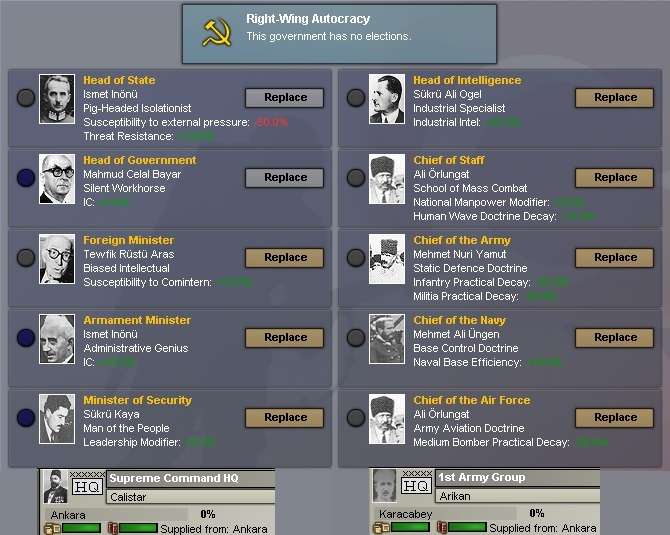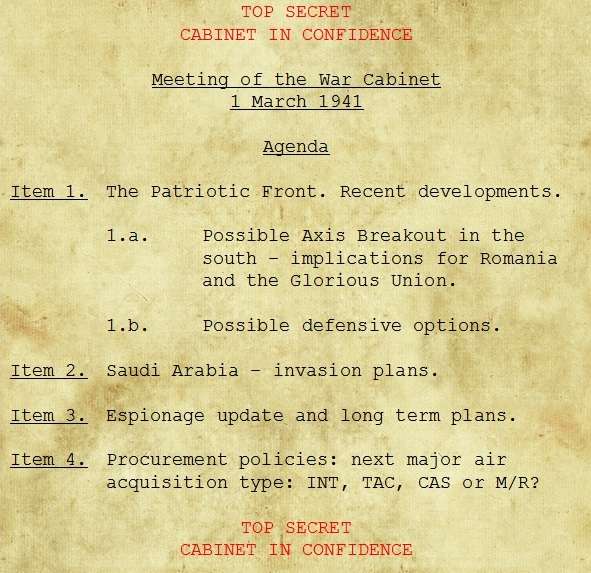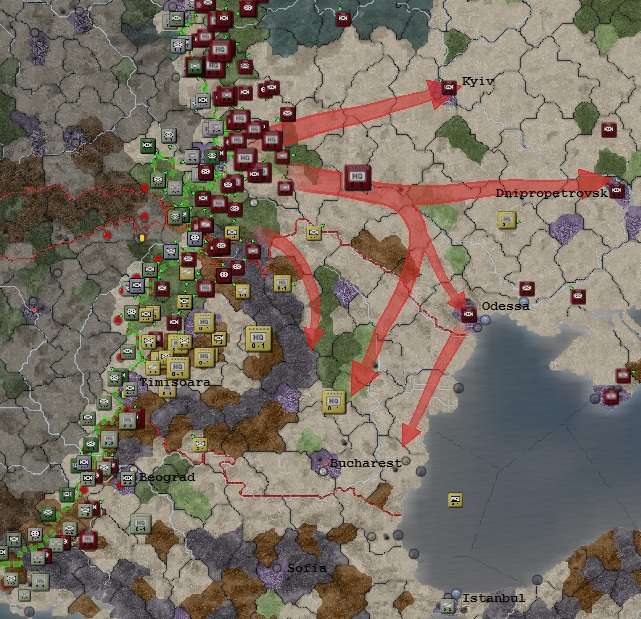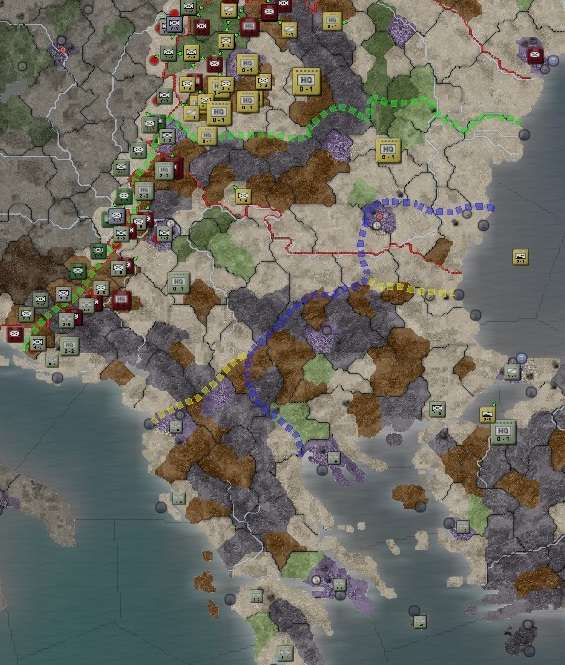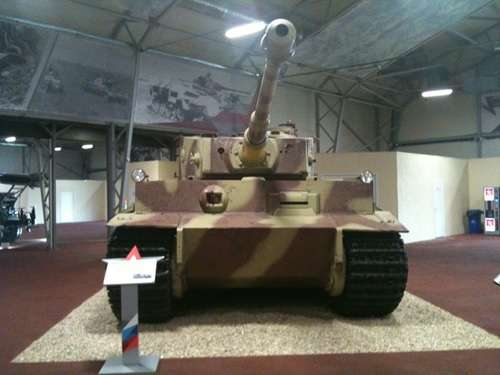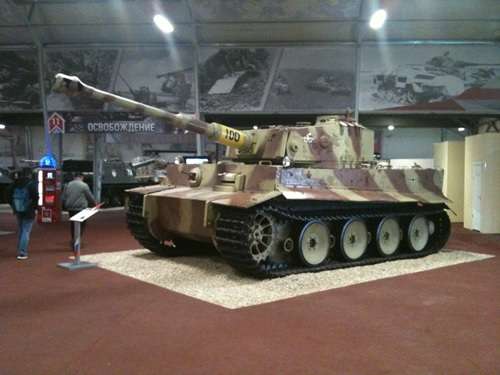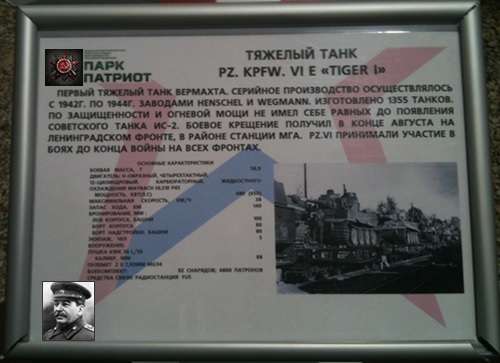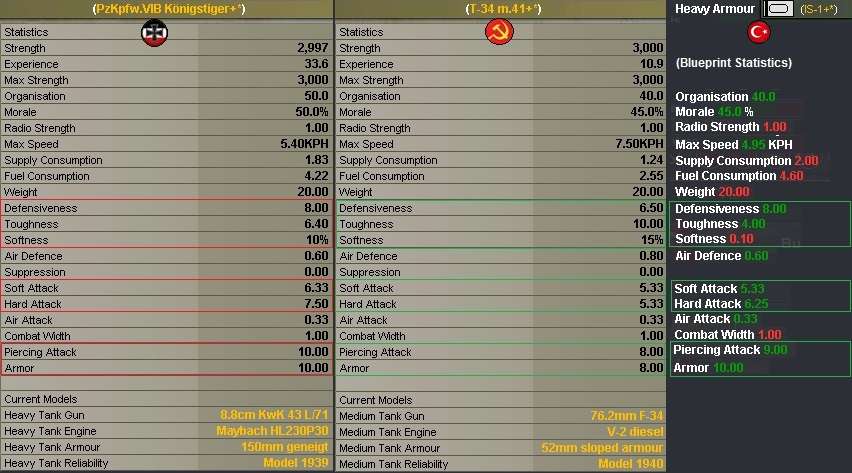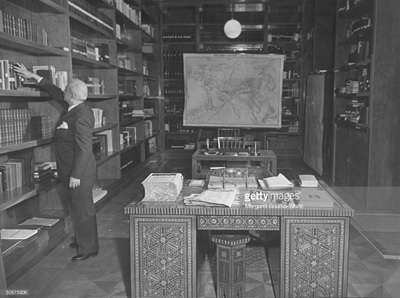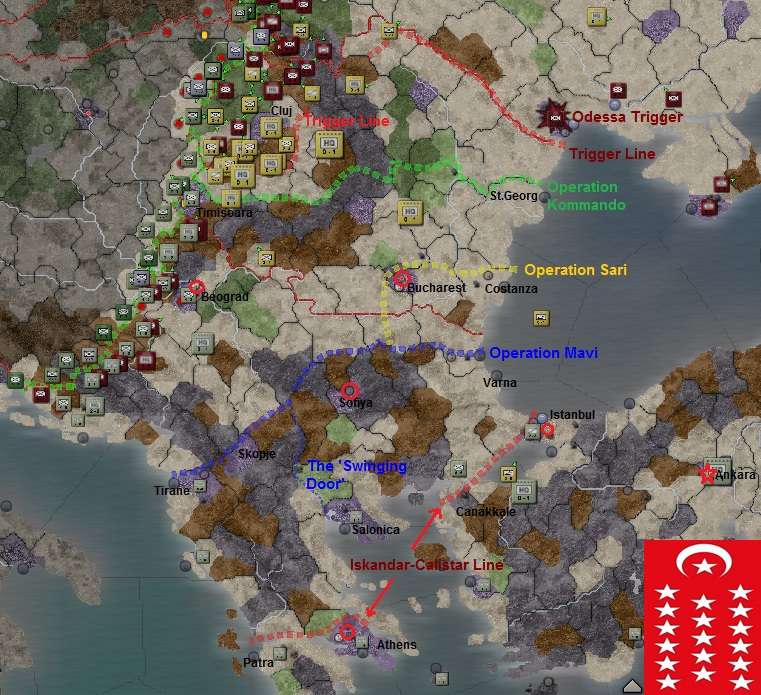Chapter 112: Emergency War Cabinet Meeting: Part 1 - the Patriotic Front (1 March 1941)
The strategic situation has been reviewed in detail, options canvassed, maps pored over, plans considered and orbats examined. Now it is time for the War Cabinet to assemble and make contingency plans. A wide range of views is on the table. This entry covers the debate about the possible direction of the war in the main European theatre – the Patriotic Front. The next chapter will deal with the rest of the Cabinet agenda.
---xxx---
First, a reminder of who sits in the War Cabinet.
In addition to the standard membership, the Supreme Commander (Field Marshal Calistar, the former War (Armament) Minister and current propaganda Minister who deputises for Inönü in the Armament portfolio when he is away at the front) and the 1st Army Group Commander (Field Marshal Arikan) are both seconded to the War Cabinet, given the nature of the meeting.
Next, PM Celal Bayar, in his capacity as Head of Government and Cabinet Secretary, formally submits the Agenda for agreement. There are no objections or amendments.
He also notes that all Cabinet members (and their advisers) have been provided ample material and the noting comments of various officials and advisors in the lead-up to the meeting
[ie the long debate we have conducted in the lead-up is taken as read.]
“We have a war to fight and, while we must give these issues due consideration, our time is precious so let us get on with it.” He pauses, then looks pointedly to Kaya and then Ögel. “And be civil.”
Turning to his Principal Private Secretary, Bayar asks: “Has the room been checked and secured?”
“Yes, Prime Minister. No listening devices were discovered.”
“Good. And you have checked for, ah, any
unconventional presences?” No-one wants to use Darth Kelebek’s name aloud, as it seems to have the coincidental effect of having him appear soon after. Even if he currently remains in Switzerland with the Ceylan-run S.I.T.H. network there. They believe.
“Ur, um, yes Prime Minister. I mean, no, Prime Minister – no, ur,
unnatural presences were found.” The aide is clearly nervous and a bit flustered.
Despite this (somewhat luke-warm) assurance, there are a number of furtive glances directed at dark corners, the ceiling and under the table. With nothing apparent, the meeting continues.
“Very well then gentlemen, we will proceed to the first item on the agenda. My Milli Şef, were there any opening remarks you wished to make?”
“Only that I encourage a very full and free discussion within these walls. So long as any decision I then take is supported and enforced wholeheartedly outside these walls.” Sycophantic nods abound in response to Inönü’s statement. “I want us to test the full range of options and, for Item 1 in particular. No-one will be derided for advancing imaginative theories.”
---xxx---
Item 1 (a. and b. considered concurrently)
The Cabinet members refresh themselves on the main threat and defensive options that have emerged from the pre-Cabinet discussions. Two large maps are displayed on the purpose-built map-wall to the side of the Cabinet table.
The threat is well understood – the worst case German breakthrough in the Ukraine followed by an armoured thrust along the Black Sea coastal corridor towards the Bosporus – ‘Situation Red’.
A reminder of the ground and the various intermediate defensive lines under consideration. The Iskandar-Calistar Line is not marked here.
“Örlungat, you have the floor,” says Bayar, nodding towards the Chief of Staff and Air Force Chief.
“Thank you, Prime Minister. First, I would like to share some information that has come to us overnight via our Chief of Military Liaison in
Moscow – Agent Boğafiltresi. In the last few weeks, the Soviets have managed to secure an intact German heavy panzer – the PzKpfw VI or ‘Tiger’. He was permitted to view it at Stalin’s secret installation at ‘Patriot Park’, outside
Moscow, and also pass on the specifications.”
[Don't worry about the little anachronisms in the Russian description here, of a slightly later-model Tiger. We have started the war a year early, after all.  ]
]
Army Chief Yamut takes up the commentary. “The Soviet information provided through Boğafiltresi has been translated and compared to the heaviest tank in the current Soviet inventory – the new T-34 medium tank – and the heavier IS-1s we have ordered and begun producing on license. Of interest: not only do the Soviets
not have any heavy tanks in their current inventory (not even a brigade of the old KV designs) but they have none in production at present either. And of course, as we well know, it would take many months for any new Soviet heavy tanks to come on line even if they started producing them now. As it stands, it looks like
we will have a heavy tank brigade before
they will!”
“As you can see from this table, in the key characteristics, these Tigers can heavily outperform the best counterpart the Soviets will be able to field for the foreseeable future. They are a fearsome beast, as Boğafiltresi’s pictures testify. Our IS-1s, when they come on line around the end of this year, will not quite match the Tiger of today (and not knowing what upgrades the Germans may incorporate by then), but it will not be too far behind. But for now, this means wherever we see German Tigers at the front, we know it will be very hard to contain them. It may partly explain the trouble the Soviets are having at the moment. These weren’t present before the fall of France – they are now. And we have seen the result. We would fare no better if they are sent against us. I’m glad we have been building new TDs in the meantime: we may need them on the
Calistar Line in coming weeks and months!”
This sobering analysis leaves the table quiet. Örlungat breaks the short silence, resuming his presentation with what he hopes are cautiously encouraging words. The aim here is clear-eyed realism, not pessimistic defeatism.
“Gentlemen, we all know the situation in the Ukraine is not yet lost. Our Soviet allies
may contain this German offensive in the south. The Romanians
may hold. The mud
may slow the Germans down, giving up plenty of time to react to further developments.” Calistar pauses for effect. “But we cannot rely on any of that. We need plans in mind in case the worst should befall us and
Situation Red, as described by the staff in your Cabinet materials, should come to pass at
any time …
from tomorrow onwards. Do we now attack to pre-empt such a breakthrough? Hold where we are for as long as possible, then fight a rolling contested withdrawal? Start to establish an intermediate defensive line somewhere in the Balkans? Or, as soon as the main line is in peril, retreat immediately all the way back to our prepared defences in Greece and the Bosporus? Arikan, I believe you had some views to put.”
“I do indeed. Some of our foremost military experts
[eg Nukeluru Slorepi, Agent SkitalecS3 and LTCOL Diskoerekto] have argued in favour of an offensive option at some key point along the
Yeniçeri Line to take advantage of any local superiority that may develop over the Axis forces there and to possibly relieve pressure on our allies – even help prevent a breakthrough in the southern Soviet sector of the Patriotic Front.” Arikan pauses for reactions.
“Sound thinking, certainly in theory,” noted Inönü, who in operational matters always prefers the offence if possible. “You will all recall we had contingency plans last year for a possible strike towards
Budapest to knock Hungary out of the war before we were ourselves attacked there, followed by the fall of France. And we had hoped for some Soviet Expeditionary Force allocations in the Balkans. They dutifully sent a decent smattering of divisions to bolster the line, but no EFs that would have allowed us full control. We can look for attacking opportunities – I’m just not convinced we will be able to exercise them prudently. And our manpower reserves and margin for error are far less than for our Soviet brothers. But the thought remains tempting.”
“My President, you know I mistrust any such plans,” offers Army Chief Yamut, a known static defence proponent. “The rewards are limited and the risks great. I was dubious about defending forward at all. It has worked so far, but in the event of a breakout I’d feel far more comfortable behind our
Iskandar-Calistar Line. The survival of the Motherland must come first – the Balkans are valuable, I’m not advocating we retreat yet or throw them away lightly – but they are all expendable.”
“I will bear that in mind, Mehmet Nuri, and think you may be right, but we will keep our eyes open just in case. Though my fear is that if the Russians need us to launch an attack with at most 4-5 divisions (the maximum we could muster and still hold the rest of the line) to save them … well, the line would already be irretrievably broken. They would rather we fell back and kept fighting than be destroyed in the Balkans and let the Axis attack them through the Caucasus.”
Inönü pauses then says: “Let us move on now to defensive options; assume we will hold in place as long as we can but will fall back when the situation demands it. Give me your thoughts.”
Yamut cuts in first. “My views are already stated and well known. Once the
Yeniçeri Line has served its purpose, we should retreat immediately to the fortified lines. There is no point risking ourselves in the field with a rampant Wehrmacht bearing down on us. Let us bleed them on our forts, while the Russians do it in their vast hinterland. We can strike back when they are weakened and we are ready.”
“I’m with Yamut on this,” chimes in Calistar – the architect of the fortification plan as the previous War Minister and still a firm adherent as Supreme (Theatre) Commander. “No half measures. The forward defence has bought more time than we ever thought it would and may buy some more yet. But when it is done, we must cut away the Balkans, no matter how it hurts, and not bother even trying to defend
Bucharest for a minute. It is too exposed and surrounded by indefensible terrain.”
[The Kelebek Approach.]
“So we turn from cats to mice?” replies Arikan, who prefers a more forward-leaning approach entirely. “If we can’t attack, then we can at least slow them down – especially if it is the Italians and Hungarians in front of us. By all means let us not risk being isolated and cut off in the west, but there is good terrain there to conduct a fighting withdrawal – even perhaps some local counter-attacks against exposed forces."
[As advocated by analysts such as SkitalecS3, LTCOL Diskoerekto and the mysterious operative known only as Wraith11B].
Arikan continues: “It would be your choice, My President, based on what you see in front of you and what happens with the Soviets in the Ukraine, but I would advocate we hold the
Yeniçeri Line as long as possible. If pressed from the north-east, see if we can convince our allies to help us man the
Green Line advocated by LTCOL Diskoerekto, even if that is just a holding line that allows our subsequent line of defence to establish itself. If that is impractical or falls quickly, we should use the
Blue Line, but extended to the Adriatic coast along the
Tirane-Skopje line, as argued by SkitalecS3. If pressed or if the enemy are thrusting through towards
Istanbul, forces there can either fight their way back to the
Iskandar Line in Greece, or move back to the
Giannitsa-Salonica segment of the
Blue Line, swinging back like a door closing towards the
Bosporus.”
Yamut and Calistar shake their heads, but others around the table are more receptive to Arikan's arguments.
“What would you do about
Bucharest then, if we do adopt this fighting withdrawal to an intermediate line?” asks Chief of Staff Örlungat – an airman, so not as confident in matters of ground strategy.
“I am in two minds about that. Some - especially Nukeluru Slorepi and our Romanian liaison RasaUrs75 - believe we should try to hold it for as long as we possibly can, as Romania would be forced out of the war otherwise. LTCOL Diskoerekto would also like to defend
Ploiesti, but the rest of us think that just too exposed. And if, as I suggest, we do more to hold in the west, it means fewer troops to hold the exposed coastal plain around
Bucharest.”
Yamut again intervenes. “If we are looking at this intermediate line, much as I dislike it and would prefer the forts and provincial AA of the
Calistar Line, I say contract the line, leave
Bucharest to the Romanians to defend – it’s
their capital – and shorten the
Blue Line to the
Varna axis. That way we may at least hold
Sofiya as well as
Athens, only losing
Beograd of our great Balkan Glorious Union cities. Our GRU liaison SkitalecS3 favours it and I agree with him, if we are to make the best of what I still think is a dangerous plan. It may be harsh, but as Darth Kelebek has said, they are in the end ‘meat shields’ for the Motherland.”
There is a pause, which lengthens, until Bayar looks around the table to see if any more wish to comment. Inönü nods at him and makes one last observation: “In my capacity as War Minister, I would also remind everyone that we can
ask our allies to defend key terrain, but they may not respond or may later be given other tasks even if they do take up a line we suggest. We cannot
order them. Therefor we cannot
rely on them. Any line we hold for any period of time
must be sustainable using our own forces alone. In the end, a shortened
Blue Line or indeed the
Iskandar-Calistar Line are the only ones we are
fairly confident of holding by ourselves. And under a concerted German-led attack at its full strength, I judge that only the
Calistar fortifications and terrain will hold them. The
Iskandar Line would be a coin toss, so we need our navy available for evacuations from southern Greece if required. With that, I will consider this item by myself and then return to you. You should be clear on my views regarding this item before we move onto the rest of the agenda, as it will affect our plans for the Saudis in particular.”
He gestures for the Cabinet to take a break. They move off for a mid-morning snack, while Inönü retreats to his office to confirm his thoughts and issue his direction to the Cabinet.”
---xxx---
A Break for Refreshment and Consideration
The Cabinet members enjoy a tasty morning snack.
And an energising cup of coffee.
While President Inönü retires to his office to ponder the next tricky route along the Path to Glory.
---xxx---
After a break of half an hour, the Cabinet reassembles under Bayar’s guidance. A short time later, Ismet Inönü returns: the Cabinet members stand until he is seated at the head of the table.
“Gentlemen, I have been impressed by all the debate that has gone into today’s consideration. Please pass on my particular appreciation for all our advisers, commentators and liaison officers who have contributed to the process. It has made it a well-rounded and thorough debate, providing me with a range of options I will be able to employ should the situation continue to deteriorate.”
“Let me provide you with my overall intent. It must by necessity be flexible, as in large part we must react to both the actions of our enemies and the response of our allies. We cannot fool ourselves into believing we can exercise anything other than local, occasional and temporary initiative in this great fight. The overall fate of the Patriotic Front, and thus our part of it in the
Yeniçeri Line, is largely in the hands of others.” He pauses to regard each member of the Cabinet with a firm gaze. “But we must never forget that our own fate, that of the Glorious Union and of our Turkish Motherland, remains in our own strong hands.”
“First, while I will look for opportunities, I am not optimistic about the potential for any localised offensives or even counter-attacks. I do not plan to launch any major offensive to relieve pressure on the Soviets in the event they look like collapsing: it would be but a pinprick compared to the forces they can marshal. Remember, our entire combined efforts were not enough to defeat or even seriously distract Germany even while all their armour was engaged on the Western Front against France. Who they still managed to defeat before the end of 1940.”
“I will not say never, but in these circumstances, we must preserve our troops and manpower reserves for a long and hard fight. And not risk a devastating counter-attack against exhausted troops tired after such an offensive, just when Romania may be failing and the Soviets in retreat to their own almost endless Motherland. That said, I think we may find some opportunities to give the Axis – especially any incautious minor Axis forces – a bloody nose if they overextend themselves.” There are a few nods and “Huzzahs” around the table at this.
“As to a defensive plan, I will consider the various options that have been advanced, as our reaction will depend on whether the Germans first break-through against the Soviets and/or the Romanians, and second whether they send strong mechanised forces our way, especially along the Black Sea coast.”
“If we can persuade our allies to cooperate and the Axis advance is not a full-on blitzkrieg, I will contemplate thinning but holding the
Yeniçeri Line and trying to extend it east through the mountains to
St. Georg: the mooted
Green Line. We will give that plan the codename
Operation Kommando, in honour of its chief proponent, our Mountaineer Kommando School CO, LTCOL Diskoerekto. Vur! Vur ha! But in all likelihood, this line – if it becomes a feasible option – would I think be more of a temporary delay line.”
“Assuming we have the time and prospects to establish it properly, the substantive intermediate line will be the shortened
Blue Line, stretching from
Tirane, through
Skopje, then following the original
Blue Line to the north of
Sofiya and then across to
Varna. That eastern flank on the coastal plain will need the strongest protection and unit density, as it has no natural defences. Simultaneously, we would issue defensive objectives for the Romanians and Soviets for the forward element of the
Blue Line trying to hold
Bucharest. If they do, then well and good. If not, we will curl into a small ball and see how long we can protect
Sofiya and the bulk of the Bulgarian GNR.”
“The western flank, as discussed earlier in our meeting, will be thinned to units we expect to eventually hold the
Iskandar Line. They can fight their way back in a delaying defence down the Greek peninsula for as long as they can stretch it out. But as soon as this new intermediate
Blue Line is formed, one division each will be sent back to both
Patra and
Athens to begin entrenching. We
must have a firm, fully entrenched, rested and 100% organised defence in both of those places when the harried stragglers start coming back. I expect to start thickening that rearward defence as the main line falls back closer to the
Iskandar Line. Ideally, by the time the enemy makes contact with it, there would be at least
two fully prepared, entrenched and organised divisions in
each location, plus others resting behind them and getting ready to rotate into the front line. A bare minimum of a full corps of five divisions will be required to hold southern Greece – preferably with a few more in reserve if possible. Some of those may be garrison or militia divisions assembled from withdrawing port garrisons to the north. Their lack of mobility will be less important when engaging in a static defence in a supporting role.”
“The main
Blue Line defence of Bulgaria and Thrace would more closely resemble the
Yeniçeri Line in nature, if we can arrange it in time. Some careful timing will be required if the
Tirane-Skopje sector has to withdraw first – the ‘swinging door’ back to
Salonica could be hard to arrange, especially if we don’t have sufficient units to establish it properly before the enemy is upon it. There are too many variables of timing, enemy action, allied cooperation (or lack of it) and the state of our own units to know what will happen with any surety. So, if activated,
Operation Mavi (‘Blue’) will be our main intermediate line. If we can hold it indefinitely and protect
Sofiya, excellent. If not, it will be a withdrawal to the
Calistar Line.”
“As mentioned above, we would call on the Romanians and (if they can spare the units) the Soviets to make a defence of the
Bucharest area. To distinguish it from the original
Blue Line plan, we will call this request to our allies
Operation Sari (Yellow), to defend the
Bucharest Salient.
“For our final defence, we would revert substantially to our original plan, with one corps each to look after
Canakkale (2nd Corps, with both the current mountain divisions required there, so they will
not be available for the bulk of any fighting withdrawal in Greece) and
Istanbul (our premier formation, 1st Corps). In each case, the Corps HQs with their specialist troops would take direct part in the defence of both places.”
“I have also note our advisers mentioned the need for having triggers in mind for any withdrawal from current positions, to try to ensure we leave neither too early nor too late. I will exercise judgement on this as the circumstances develop and consult commanders and advisers if necessary. But in general terms, I have in mind the following as triggers. They are in no particular order:
- A serious breach of the Yeniçeri Line that we cannot quickly rectify through a counter-attack or the establishment a new line of defence immediately in front of the break.
- A collapse of the line in Romania that sees the enemy approaching the open plains to the north of the Carpathians.
- The crossing of any major force, especially German armour, into open plains territory over Romania’s eastern border.
- The seizure of Odessa by the Axis.”
“This is not to say I would necessarily wait for these things to occur before ordering a withdrawal, but I think if the latter two occurred it would be too late to enact at least
Operation Kommando, if not
Operations Mavi and
Sari.”
“I have had my Adjutant mark up a map depicting these various lines and trigger points. They will be a guide, but not a rigid plan. I authorise its sharing, under strictest security protocols and limited distribution, with our Romanian and Soviet allies. They will need to know our ‘red lines’ in order to plan their own responses. I do not believe any of these are unreasonable.”
“Aras,” says Inönü, turning to his Foreign Minister, who has until now said little. “You are to particularly reassure the Soviets that we
will hold until the last safe moment in the event of a German breakout. But inform them that we, like they, will then ensure we remain in the anti-Fascist fight, keep their southern flank secure, do our part to drain the Fascist beast of its life’s blood, and march with them shoulder to shoulder when it comes time to attack and destroy the monster in its nest.”
“With Romania ... we must be a bit sensitive in our dealings with them. Stress our hopes that none of this will be necessary, that if there is a retreat it may be possible to hold the
Kommando Line, but only with their and Soviet help. If that fails, they must be prepared to defend themselves in
Bucharest, while we try to hold off everything else to the west of that. Much as we have done so far.”
“There is one other task I want your advice on. You too, Ögel. Consult your experts and analysts on this and give me the best advice you can. If Romania falls on the loss of
Bucharest, I’m assuming they will form a Government-in-Exile, given they are members of the Comintern Pact. But would all their forces, here and in the Far East, surrender? Or will any on foreign territory at that point fight on? This will not only be important to our Soviet allies in their fight against Japan but will affect how we ask them to fight if it comes to the last ditch around
Bucharest. If we assume that any Romanian units on their own territory will surrender but those on our or Soviet territory may continue to fight - whether in their own colours or perhaps even becoming Expeditionary Forces – then we may try to formulate a plan to encourage some of them to fall back to our territory before the end, even if it means temporarily running interference for them in
Bucharest (or seeing if the Soviets could, if they have units left in the area by then). Depending on your answers, I may modify some of our plans if the time comes.”
“That is all on this Item, Bayar. Let us now move onto the next.”
---xxx---
Author’s Note: I felt this was enough for one entry, rather than tapping out a single over-long Cabinet Minute. It will also give some room in the next chapter for a little more on some of the narrative side-stories that have been pushed somewhat further to the side of late due to the press of critical battlefield issues.
Coming Up: The rest of the Cabinet agenda, including invasion plans for Saudi Arabia, espionage plans and production issues will be debated. Will Turkey be setting the pace for regional events – or waiting on others to take the initiative and then counter-punching? Can the Soviets hold the Germans, or at least slow them down considerably? Can Romania survive or - in a domino effect - has the lamentable and preventable fall of France also doomed Turkey’s close ally?


